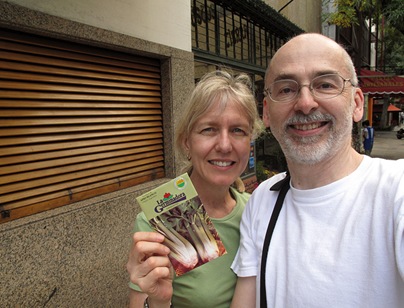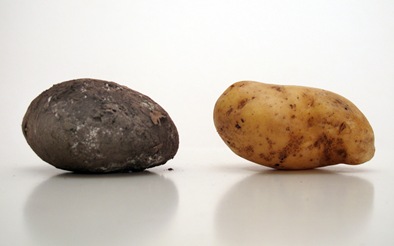Sub-title: Grocery shopping in Buenos Aires
Tuesday, March 24, 2009.
We are in Buenos Aires and it has been marvelous. It's in the upper 80's and sunny every day so far (we arrived Saturday morning). The ten-day forecast ranges from sunny to partly cloudy and in the upper 70's to upper 80's. We've been very laid back. Just riding our bikes into new neighborhoods; exploring. Yesterday, the bulk of the day was taken up shopping for ingredients to prepare dinner for our friends Adriana and Carlos tonight. We shopped yesterday because today is a holiday here and we're not sure what stores will be open. Much of what we needed to buy involved a search because the ingredients are either not common here or have to be bought in a specialty shop. One example is celery seed. First of all, grocery stores and supermarkets generally don't carry herbs and spices. You have to go to a store called a dietetica.
A small dietetica
These are small shops that specialize in herbs and spices, as well as natural products and alternative medicines. We visited several dieteticas and were surprised that none carried celery seed. At the start of search we were hampered by the fact that we only knew the word for celery, in Spanish (apio), but the word for seed. Our Franklin translator only has the verb "seed," but not the noun. The woman in the first dietetica assured me that the verduleria (vegetable store) next door would have it. (Also called a fruteria-verduleria). The green grocer rummaged around and finally offered me nice bunch of celery, which I politely declined. And the search resumed.
While I was running into the stores, Carolyn guarded our bikes. At one point she struck up a conversation with two school girls who spoke English (I don't know how this happened). This was fortuitous because they told us the word for "seed." Semilla. Yippee! Now we could do some shopping! Semillas de apio!
The helpfull schoolgirl
We stopped at two more dieteticas. The additional knowledge it didn't help, other than it gave the appearance that I knew what was looking for, which simply encouraged the people in the dieteticas to offer me alternatives to consider. i.e. alternatives from the perspective of alternative medicine purposes. I don't think that works for recipes, but perhaps I'm wrong. Substituting basil for celery might result in an entirely different but perfectly tasty dish.
In desperation, we resorted to looking at the COTO (a supermarket). Surprisingly, they did offer an assortment of condiments, herbs and spices in a section of imported foods. They had, for example, cayenne, which we had already found previously in a dietetica. (More on cayenne below). They also had an interesting assortment of condiments from the U.S. that I have never seen in the U.S., as well as various Asian stuff, but no celery seed.
Carolyn spied the awning and tables of Don Julio at the end of the block. We decided to postpone the search in favor of lunch. After my brain had been degreased with a couple of glasses of wine, I asked the waiter if he knew where some semillas de apio might be had. He offered to ask the cook and returned with an out of the box thinking type answer: Go to the the end of the block and around the corner there is a garden center. They sell seeds at the garden center. Eureka!
Eureka! Celery seeds!
Last night our friend Silvia had us over for dinner. We related search. When I mentioned my search for small red potatoes, which I eventually found in a she smiled and explained that they are not normally found in the supermarket or even the verduleria. Nope. They only sell the large white potatoes. She told us that you have to keep an eye out for one of the Bolivian women that claim a spot on the sidewalk to sell their small stock of vegetables, herbs and spices. These women often have the "Bolivian potatoes." i.e. Small red potatoes.
This morning we discovered that somehow we managed to lose the precious package of celery seeds. It probably fell out of the bicycle basket. Tuesday morning Tito suggested a store called KLeR, which sells spices, but it was closed for the holiday. He led me to a flower stand on the corner, which I thought would be an unlikely place, but the vendor apologetically explained that he usually had celery seeds, but was out of stock due to the constant demand. Demand? He explained, with a wink, that celery seed is a natural alternative to Viagra. Later Carolyn and I went to the big garden center on Scalabrini Ortiz, Vivero Mario and found they had plenty of celery seed in stock. Finally we had the 1/2 teaspoon that we needed for the salad dressing! See the recipe HERE.
More on shopping for groceries . . .
Another search involved potatoes. Small red potatoes. I went to at least a half dozen verdulerias and the COTO but the only thing I could find were large white potatoes. Eventually I stumbled across a small verduleria that had what were small dirt-encrusted potatoes. Not red, but at least they were small. The next day Tito confirmed, with a broad smile, that the common potato found in stores and verdulerias are large white potatoes, "with dirt or without . . . as you like." Our friend Silvia noted that near all the large supermarkets one will find one or more Bolivian ladies sitting along the sidewalk selling vegetables, fruit, herbs and spices. These ladies typically have small potatoes (papas bolivianas). But as for red potatoes . . . we have not see any.
Potatoes . . . with dirt and without
Spicy food is generally not in the repertoire of Argentine cooks. Indeed, we once found Tabasco sauce in the supermarket and were amused to find that it was marked "MILD." Surprisingly, we had less trouble finding cayenne pepper than celery seed. The second or third verduliara had them. Unlike ground cayenne pepper in the U.S., the peppers are ground by hand and include the seeds. See photo below.
A bag of ground cayenne pepper
Delivery
Virtually every store delivers. Supermarkets, cafes, restaurants, electronics . . . you name it; they deliver. Even a cup of coffee. We often see elderly people leaving the grocery store, accompanied by a delivery boy. In a dense urban environment, where cars are not used for shopping, delivery is an essential service.





